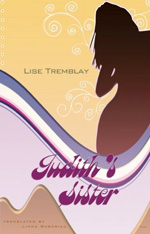
The nameless narrator (let's call her Miss X) of this engaging rite-of-passage novel is a twelve-year-old Catholic girl growing up in a small rural town in Quebec. Her stoic father works in the timber industry and only comes home for the weekends. Her highly strung, unpredictable mother is a dressmaker who finds it stressful caring for her four boisterous children while her husband is away. The mother relies on the narrator to keep an eye on the younger siblings and to do the housework. The family lives in a working class neighbourhood where there seem to be many depressed, frustrated women (some with violent, alcoholic or philandering husbands), and Miss X finds herself drawn into their various domestic dramas.
It is the summer of 1968 and our young heroine is in a state of transition—physically, intellectually and emotionally. Having left the convent primary school and those annoying nuns behind for good, Miss X is about to attend a public high school, having been accepted into the highly competitive enrichment programme.
However while her mother may have high hopes for her clever oldest daughter, at the beginning of the novel Miss X is still pre-occupied with boys, clothes, gossip and hanging out with her best friend, Judith. The impressionable girls idolise Judith's older sister, Claire, known as the prettiest young woman in town. Not only is Claire almost engaged to a young med student from a wealthy family, but she is also a talented go-go dancer who is about to become part of the backup band for a popular Canadian singer. Our naive and easily impressed narrator cannot imagine a more glamorous life than the one it seems that Claire is about to embark on. Miss X's mother, on the other hand, considers Claire to be one of the silliest girls she knows and she is determined that her own daughter will escape the restraints that early marriage and motherhood would inevitably impose on any intelligent woman. In a town where most girls are married with children before the age of twenty, Miss X's mother is ahead of her time in wanting her daughter to have a good education and a meaningful career.
When the two girls are not busy shadowing the vacuous, self-engrossed Claire, they spend much of their summer "stalking" a handsome, baseball playing barber. If Claire is the romantic heroine they want to be like, then the dashing Marius is the shining knight they hope to marry. But then the unexpected happens and suddenly, like a kaleidoscope that has been shaken, the pieces of the puzzle rearrange themselves. Miss X and her best friend find themselves viewing the world differently for the first time. By the end of the summer our narrator is no longer Judith's best friend, and she is beginning to stretch her wings beyond the confines of her neighbourhood.
Although Judith's Sister may initially seem rather slight in both size and content, it is an entertaining and
enlightening glimpse into the mind of a young girl on the cusp of adulthood. Like Jane Austen's Emma, this
novel is awash with gentle irony—Lise Tremblay constantly pokes fun at her narrator while simultaneously
making the reader feel genuine sympathy towards her. On another level, Judith's Sister is also a thoughtful
study of the lives of ordinary working class women in the late 1960's who were trying to find some degree of
fulfilment and happiness within marriage and motherhood.

TalonBooks, paperback, 9780889226777
